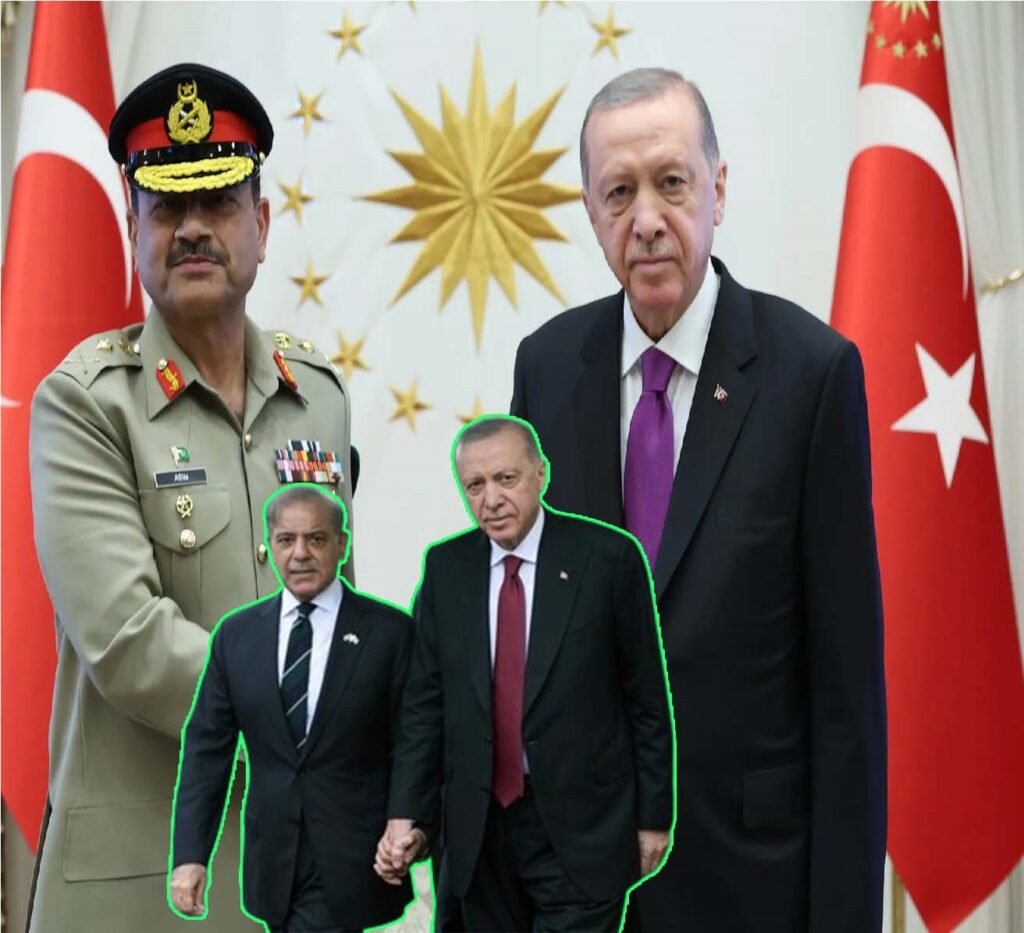
- The visit of the Pakistani Prime Minister and Army Chief Asim Munir to Turkey signifies that the two countries are on the same page in their geopolitical understanding.
- Türkiye, under Erdogan, wants to project itself as the de facto leader of the Islamic world and hence is aligning itself with countries that have significant Muslim populations and is portraying itself as a guardian of Muslim rights worldwide.
- Pakistan sees Türkiye as a key player capable of upgrading its military-industrial complex, especially in areas like drone technology and offensive military capabilities.
- India can adopt a geopolitical balancing strategy and strengthen its relations with countries that are at odds with Türkiye, such as Armenia, Greece, and Cyprus
Pakistan Prime Minister Shehbaz Sharif is on a four-nation visit from May 25 to May 30. This is the first foreign visit by the Pakistani Prime Minister since the recent escalation with India. The trip’s first stop is Turkey, after which he will travel to Iran, then Azerbaijan, and he will end his trip by visiting Pakistan. It is important to note that the first visit he has undertaken after the conflict with India is to Turkey. There is no doubt that the relationship between Turkey and Pakistan has entered a new chapter, not only in terms of bilateral ties but also in the form of deeper strategic cooperation between the two nations.
The Pakistani Prime Minister met President Erdogan and called him the “big brother.” Along with him was the newly promoted Field Marshal Asim Munir, who was previously the Army Chief. He also met Turkey’s Defence Minister and the Turkish Army General. It is now very clear that, even from the start of the conflict, Turkey, along with Azerbaijan, were the two countries that openly supported Pakistan. The visit by the Pakistani Prime Minister to Turkey signifies that the two countries are on the same page in their geopolitical understanding.
Now, it is important to understand what Pakistan wants from Türkiye and what its interests are. One of the key commonalities between Pakistan and Türkiye is their shared animosity towards India. The differences between Türkiye and India are not primarily geopolitical. Instead, they stem from ideological factors. Türkiye, under President Erdogan, wants to project itself as the de facto leader of the Islamic world. In this pursuit, it is aligning itself with countries that have significant Muslim populations and is portraying itself as a guardian of Muslim rights worldwide.
Given that India’s neighbouring countries—such as Bangladesh, the Maldives, and Pakistan—are Muslim-majority or have significant Muslim populations, Türkiye feels compelled to take positions that often place it in opposition to India. Thus, the conflict between India and Türkiye is more ideological than geopolitical. That said, there are some geopolitical elements too. Türkiye’s increasing influence in regions like Syria and its aspirations to extend its reach into Asia have put it in indirect competition with India, which it perceives as a strategic challenge.
So, what does Pakistan want from Türkiye? One of the main things is defence cooperation. Türkiye is seen by Pakistan as a key player capable of helping to upgrade Pakistan’s military-industrial complex, especially in areas like drone technology and offensive military capabilities. Given this, Türkiye is seen as a natural ally by Pakistan. Since Türkiye has openly supported Pakistan during the India-Pakistan escalation, it is evident that their bilateral relationship has entered a new strategic phase. Türkiye is expected to assist Pakistan in enhancing its defence capabilities, which could, in turn, be used to create a sense of deterrence against India.
Now, the bigger question for India is: what countermeasures can it take, given that the relationship between Türkiye and Pakistan is a bilateral matter that India cannot directly prevent? In this context, India can adopt a geopolitical balancing strategy. Just as Türkiye is strengthening its ties with Pakistan, India can strengthen its relations with countries that are at odds with Türkiye, such as Armenia, Greece, and Cyprus. These countries have faced Turkish territorial aggression, and India has already been taking steps to deepen its strategic cooperation with them. For example, India has recently provided strategic support to Greece and is working to build closer ties with these nations. This could serve as a counterweight to the Türkiye-Pakistan axis and help maintain regional stability.
Aayush Pal is a freelance writer on contemporary geopolitical developments. The views expressed in his work are entirely his own.
